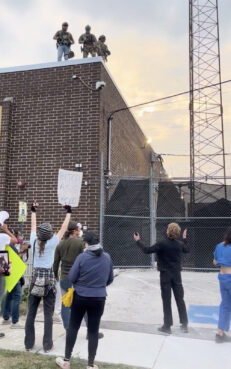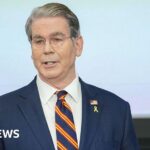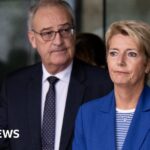(RNS) — A federal judge in Illinois has issued a temporary restraining order barring government agents from using a number of forceful tactics against faith-based demonstrators who have been protesting outside a Chicago-area U.S. Immigration and Customs Enforcement facility. The order hands a win to activists who say their right to religious freedom has been violated by law enforcement who repeatedly shot them with pepper balls and other projectiles.
The order, handed down Thursday (Oct. 9), came three days after the complaint was filed against Department of Homeland Security Secretary Kristi Noem. Although the suit was primarily brought by journalists who allege they have been targeted by federal agents, the list of plaintiffs also included the Rev. David Black, a Chicago-area Presbyterian minister.
According to journalist Dave Byrnes, Judge Sara Ellis mentioned Black during court proceedings on Wednesday, recounting an incident that took place last month when Black was filmed praying in front of the ICE facility in Broadview, Illinois. As the pastor finished his prayer, footage shows federal agents firing at him using pepper balls, which can cause eye irritation and respiratory distress. Black was struck multiple times, including in the head.
Other faith-based demonstrators and clergy say they have also been pelted with nonlethal rounds while protesting at the facility, as religious activists have been a regular presence at the location for the past few weeks.

The Rev. David Black prays below masked agents on the rooftop of an ICE detention facility in Broadview, Ill. (Video screen grab)
According to Byrnes, Ellis said during court proceedings that the plaintiffs had sufficiently argued that the federal government’s use of force against people praying at the site “substantially burdens their exercise of religion.”
In her order, the judge barred agents from using a list of “riot control weapons” on “members of the press, protesters, or religious practitioners who are not posing an immediate threat to the safety of a law enforcement officer or others.” The order also prohibits the firing of “compressed air launchers” and similar weapons at “the head, neck, groin, spine, or female breast, or striking any person with a vehicle, unless the person poses an immediate threat of causing serious bodily injury or death.” In addition, agents, who have been criticized for wearing face masks, are instructed by the order to wear “visible identification.”
The 14-day order is limited to the northern court district of Illinois, which encompasses roughly a third of the state, including Chicago.
Asked by Religion News Service earlier this week about Black and the lawsuit, DHS Assistant Secretary Tricia McLaughlin responded Wednesday afternoon with a statement, shortly before posting the same statement on her X feed. McLaughlin said Black was among demonstrators “blocking an ICE vehicle from leaving the federal facility — impeding operations.” Referring to “agitators,” not Black specifically, she said they were verbally warned.
“If you are obstructing law enforcement you can expect to be met with force,” McLaughlin said in the statement.
On Wednesday, Amanda Tovar, the person who filmed the widely shared video of Black being shot with pepper balls, disputed McLaughlin’s description of events in an interview with CNN, saying “that’s not true.”
McLaughlin also referred to Black as a “pastor,” using quotation marks. RNS confirmed Black is an ordained minister of First Presbyterian Church in Chicago, operating underneath the Presbytery of Chicago.
A wide array of religious leaders have criticized President Donald Trump’s immigration policies throughout his second term; the administration, meanwhile, has used Bible quotations to support its immigration enforcement efforts on social media.
Clergy have participated in protests supporting immigrants in several cities, confronted apparent federal agents on church property and filed lawsuits in opposition to the president’s mass deportation agenda. Pope Leo XIV, like his predecessor Pope Francis, also recently spoke critically of Trump’s immigration policies, referring to the treatment of immigrants in the U.S. as “inhuman.” He also told Latino Catholics who work with immigrants that their work is “perhaps especially” important in the U.S., and he urged American bishops to speak out.
However, faith leaders in Chicago say tensions surrounding the Broadview facility have escalated over the past few weeks. The Rev. David Swanson, pastor at New Community Covenant Church on Chicago’s South Side, declined to comment directly on the lawsuit, explaining that he’s only been a part of demonstrations at Broadview on one occasion. But he said that during his visit, when large numbers of demonstrators assembled near the facility last Friday, the behavior of DHS agents left him unnerved.
At one point, he said, senior Border Patrol official Gregory Bovino — who has become a visible presence in DHS immigration enforcement — walked over to where Swanson and others were standing and began shoving the pastor while yelling in his face. Swanson, who was wearing a clerical collar, said Bovino yelled “I’m not going to tell you again” even as the pastor continued to move back. Part of the incident was documented by a Associated Press photographer; however, DHS officials did not respond immediately to comment on the interaction.
Swanson said the experience differed dramatically from demonstrations elsewhere he has attended. In the past, he said, he has tried to be “a presence for peace in situations that can get volatile” and a “person who different sides can be able to approach and talk with and have conversations with.” But his experience at Broadview felt different.
“This was the first time that I felt like there was absolutely no regard and no respect for a person who was visibly associated with a faith tradition,” Swanson said. “It did not seem like it made one iota of difference.”



